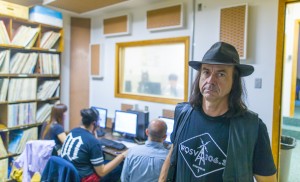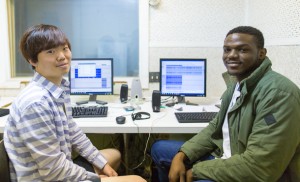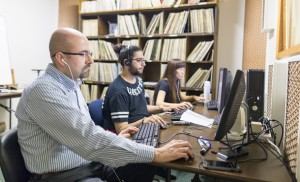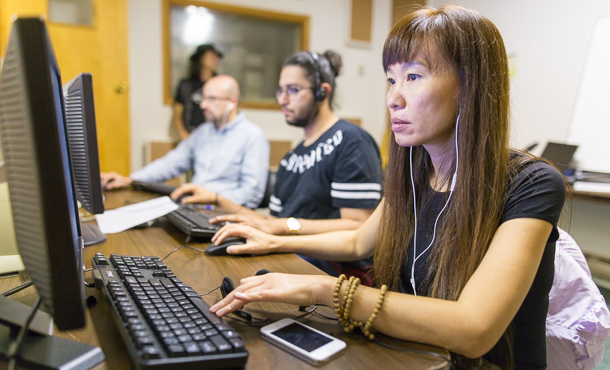Ha Yeong Ahn sits at a computer terminal in the former WEMC studio building atop the hill at Eastern Mennonite University (EMU), practicing a script for a recorded radio show.
“You’re really punching the onset of that syllable each time,” says lecturer James Smoot, pointing over Ahn’s shoulder to a graphic representation of Ahn’s voice patterns on the screen. “See, each peak is a syllable.”
As Ahn, a student from South Korea, returns to the script, Smoot elaborates: “I can tell so much about how these students speak by the wave patterns. It’s a very effective pedagogical technique if you have the resources and flexibility to do it. My idea is to get them to pay attention to the way they speak—not only hear themselves, but see it, too.”

The radio show is part of Smoot’s work with EMU’s Intensive English Program (IEP), an immersive experience that helps students build their language skills. Students in the June class came from Saudi Arabia, Colombia, Congo, China, Kurdistan, Iraq and South Korea—a mix of international students and legal US residents.
About 60 to 80 students work on pronunciation, comprehension, and reading and writing skills through semester-long classes, small-group sessions, tutoring and computer lab work. This spring, Smoot hit on a new way to do that learning in a real-life setting that also enhances community connections: a radio program broadcast on WQSV 106.3 FM in Staunton, Virginia.
“The Three Continents Music Show” airs at 8 p.m. Wednesdays this summer on the community station, featuring student-chosen music from Asia, Africa and South America interspersed with the students from the various countries talking about the stories and culture that shape the music.
“I did community radio in Portland, and it’s something I really believe in,” Smoot says. “When they started the Staunton station, I said, ‘What can I do to help out?’ They suggested making some produced content instead of just live stuff. I thought of a show about music to involve immigrants, but in an interesting way. You learn so much about people from their songs and what they have to say about those songs. It was a way to get many things done at the same time.”
Back in the radio business

For that to happen, Smoot needed a space where production could happen. He found a ready-made one on EMU’s campus, in the studio used by WEMC until it merged in 2007 with WMRA, a station owned by James Madison University.
Smoot received permission to use the old studio, which already had soundproofed spaces, control rooms and other necessary elements. The EMU physical plant and information technology teams fixed it up and equipped it with computers and microphones.
“We got so lucky by getting this place,” says Smoot. “I was very surprised when everyone down the line said, ‘Yes.’ It’s really, really cool.”
And now students are benefiting as a result. The first four shows were produced during the spring semester as an extracurricular project. The summer group has woven the production into the class itself, doing the editing and production work alongside the language training. The first show was broadcast on June 1, and a total of 14 are planned at this point.
Radio production improves accents

Kathleen Roth, director of the IEP program, has been pleased with the creative effort.
“One of the things IEP has been concerned about is accent. Sometimes our students know English quite well and can read and write but have trouble communicating,” Roth says. “James was thinking about that and learned about the radio station on the hill and the equipment there. He asked me if he could pursue that, and I said, ‘Absolutely!’ It’s just worked out really well.”
The students have enjoyed it, too. Ahn says he has had fun selecting Korean songs and weaving them into a show.
“The first time using the program was very hard for me, but now it’s easy,” Ahn says. “I’m happy that I can do a broadcast program and record my voice.”
Enock Mukanda Samalenge, a student from Congo, says it takes imagination to put a good show together, trying to represent the myriad of cultures found in his country.
“You have the ability to choose what kind of show you want to do,” Samalenge says. “So if you want to do something about love, you choose some specific songs and use the editing program to mix it with your words. And sometimes you listen to what you say, and it helps you understand more what errors you do when you speak and to improve the language.”
More shows possible
WQSV is a low-power station with a broadcast radius of only about 10 miles, but the shows are also streamed live at www.wqsv.org. IEP staff are also hopeful that eventually Harrisonburg’s WMRA might rebroadcast the shows on that station.
Smoot would like to see the broadcasts will endure beyond the summer, but he says that will likely require others to help with the time-intensive work. Shorter classes during the academic year and the rotation of IEP’s offerings could also pose challenges. Without a doubt, though, it has been a positive experience so far.
“It’s a lot of work, but I get really charged up about it,” Smoot says. “I’m like a kid in a candy store. It’s the most interesting thing I’ve done in my three years at EMU.”

Awesome!
Very creative. Glad to see the old, on-campus WEMC station getting put to good use!
Amazing show! I love listening to the students. Though I have had some of these students in my classes, I learn new and interesting things about them. Thanks for your efforts, James.